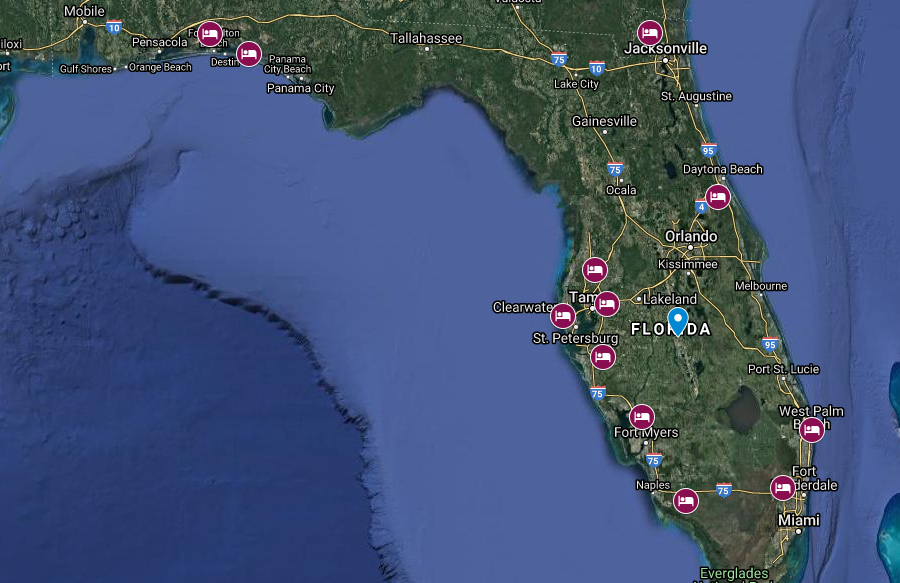
TALLAHASSEE, FL – The Florida Department of Health has received notification of one new positive case of coronavirus disease (COVID-19) in Florida. This test was performed through a partnership with AdventHealth Altamonte Springs.* To keep Florida residents and visitors safe and aware about the status of the virus, the Department is issuing regular updates as information becomes available.
As an update to the ongoing epidemiological investigation in St. Johns County, it was determined that the individual who traveled to Florida from New York to attend Bike Week was isolated prior to attending the event. We are continuing to encourage Floridians to stay vigilant and advising Florida municipalities to consider limiting large gatherings. (eltiempolatino.com
New Positive Cases
- A 68-year old male in Seminole County has tested positive for COVID-19. He is isolated and will continue to remain isolated until cleared by public health officials. This is a travel-related case and is associated with a Nile River cruise/tour in Egypt.
Nile Cruise Advisory
The Florida Department of Health is advising all individuals who traveled to Egypt for a cruise or tour on the Nile River in February or March 2020 to self-isolate for 14 days following their date of return to the United States, and if ill, immediately contact their CHD or health care provider. Several passengers in the United States recently developed symptoms and have been confirmed to be infected with COVID-19, including 11 positive cases in Florida.
COVID-19 Cases
Florida Residents Diagnosed in Florida
| County | Age | Sex | Travel** Related | |
| 1 | Manatee | 63 | Male | No |
| 2 | Hillsborough | 29 | Female | Yes |
| 3 | Santa Rosa | 71 | Male | Yes |
| 4 | Broward | 75 | Male | No |
| 5 | Broward | 65 | Male | No |
| 6 | Lee | 77 | Female | Yes |
| 7 | Lee | 77 | Male | Yes |
| 8 | Charlotte | 54 | Female | Yes |
| 9 | Okaloosa | 61 | Female | Yes |
| 10 | Volusia | 66 | Female | Yes |
| 11 | Manatee | 81 | Female | Yes |
| 12 | Broward | 67 | Male | No |
| 13 | Volusia | 60 | Female | Yes |
| 14 | Broward | 69 | Female | No |
| 15 | Nassau | 68 | Male | Yes |
| 16 | Collier | 73 | Male | Yes |
| 17 | Collier | 68 | Female | Yes |
| 18 | Collier | 64 | Female | Yes |
| 19 | Pinellas | 67 | Male | Yes |
| 20 | Pinellas | 64 | Male | Yes |
| 21 | Pasco | 46 | Male | Yes |
| 22 | Miami-Dade | 56 | Male | Yes |
| 23 | Broward | 70 | Male | Under Investigation |
| 24 | Lee | 57 | Male | Under Investigation |
| 25 | Broward | 65 | Male | Under Investigation |
| 26 | Broward | 61 | Male | Yes |
| 27* | Seminole | 68 | Male | Yes |
* The Department of Health will confirm cases reported by commercial labs.
** A known history of exposure to COVID-19 outside of the state.
Port Everglades Advisory
The Department, through an extensive epidemiological investigation, has identified four positive COVID-19 cases associated with Port Everglades in Broward County, Florida. All three cases are connected to or employed by Metro Cruise Services – a company that operates at Port Everglades.
- The Department recommends all individuals experiencing symptoms who have recently traveled through Port Everglades to immediately contact their CHD or health care provider and self-isolate for 14 Days.
- The Department also recommends employees of Metro Cruise Services at Port Everglades with any association to these cases self-isolate at home.
- The Department is working to connect with all employees at Metro Cruise Services who may have come into contact with the three individuals who have tested positive for COVID-19 to provide the employees with the appropriate guidance and monitoring.
- The Department is working in close consultation with the CDC on this investigation.
- CDC recommends that individuals with recent travel history on a cruise monitor their health for 14 days and, if they develop symptoms, immediately self-isolate and contact their CHD or health care provider.
International Travel Advisory
The Department is advising all individuals who have traveled internationally to follow the new Centers for Disease Control and Prevention (CDC) guidelines, summarized below:
- Level 3: CDC recommends 14-day self-isolation and social distancing upon return to the United States. Social distancing includes avoiding going out in public and close personal interactions. If you become symptomatic, immediately self-isolate and contact your County Health Department (CHD) or health care provider.
- Level 2 and Cruises: Travelers should monitor their health and limit interactions with others for 14 days after returning to the United States. If you become symptomatic, immediately self-isolate and contact your CHD or health care provider.
- For more information regarding current CDC travel advisories related to COVID-19, visit: https://www.cdc.gov/coronavirus/2019-ncov/travelers/index.html
COVID-19 Public Website and Call Center
Please visit the Department’s dedicated COVID-19 webpage for information and guidance regarding COVID-19 in Florida.
For any other questions related to COVID-19 in Florida, please contact the Department’s dedicated COVID-19 Call Center by calling 1-[email protected].
Department Activities
- Governor Ron DeSantis issued Executive Order 20-52 declaring a State of Emergency for COVID-19.
- Governor Ron DeSantis directed the Florida Division of Emergency Management to activate to Level II to coordinate the state’s response to COVID-19.
- Governor Ron DeSantis issued Executive Order 20-51 directing the State Surgeon General to declare a Public Health Emergency.
- State Surgeon General Dr. Scott Rivkees declared a Public Health Emergency for COVID-19 in Florida.
- Established an Incident Management Team to coordinate response operations.
- Activated a dedicated incident command post for on-site response activities.
- Conducted public health and health care stakeholder conference calls to provide statewide updates on the current outbreak situation, response actions and guidance for pandemic planning. Over five hundred participants joined these calls.
- Participated with the Agency for Health Care Administration (AHCA) on statewide conference calls with nursing homes, assisted living facilities and hospitals.
- Established a public call center for questions regarding COVID-19.
- Developed and distributed an updated COVID-19 presentation to CHDs for use at community meetings.
- Implemented protocols for investigation, surveillance and monitoring for COVID-19 to rapidly detect and contain cases.
- Established mechanisms for ongoing monitoring and coordination with the CDC regarding epidemiological activities.
- Distributed CDC Interim Guidance for public health personnel evaluating Persons Under Investigation (PUIs) and asymptomatic close contacts of confirmed cases at their home or non-home residential settings to CHDs.
- Distributed the updated Clinician Screening Tool for identifying PUIs for COVID-19 and a health care provider letter regarding Enhanced Surveillance and Preparedness for COVID-19 to associations, licensed providers, Health Care Coalitions and CHDs.
- Implemented testing at all three State Public Health Laboratories.
- Distributed updated CDC guidance for schools to CHDs and the Department of Education.
- Distributed updated Laboratory Guidance regarding implementation of testing at State Public Health Laboratories.
What you Should Know
COVID-19 can spread from person to person through small droplets from the nose or mouth, including when an individual coughs or sneezes. These droplets may land on objects and surfaces. Other people may contract COVID-19 by touching these objects or surfaces, then touching their eyes, nose or mouth.
Symptoms of COVID-19 are fever, cough and shortness of breath. Symptoms may appear in as few as two days or as many as 14 days following exposure. Most people recover from COVID-19 without needing special treatment. The elderly and those with underlying medical problems like high blood pressure, heart problems and diabetes are more likely to develop serious illness.
There is currently no vaccine to prevent COVID-19. The best way to prevent illness is to avoid being exposed to the virus. The Department recommends everyday preventive actions to help stop the spread of respiratory diseases, including:
- Avoiding close contact with people who are sick;
- Staying home when you are sick and avoiding contact with persons in poor health;
- Avoiding touching your eyes, nose and mouth with unwashed hands;
- Covering your cough or sneeze with a tissue, then disposing of the tissue;
- Washing your hands often with soap and water for at least 20 seconds, especially after going to the bathroom, before eating, after blowing your nose, coughing or sneezing;
- If soap and water are not readily available, use an alcohol-based hand sanitizer with at least 60% alcohol. Always wash hands with soap and water if hands are visibly dirty; and
- Cleaning and disinfecting frequently touched objects and surfaces using a regular household cleaning spray or wipe.
The CDC does not recommend that asymptomatic, healthy people wear a facemask to protect themselves from respiratory diseases, including COVID-19. Facemasks should be used by people who show symptoms of COVID-19 to help prevent the spread of the disease to others. The use of facemasks is also crucial for health workers and people who are taking care of someone in close settings (at home or in a health care facility).
A person that experiences a fever and symptoms of respiratory illness, such as fever, cough or shortness of breath, within 14 days after travel from China, Italy, Iran, South Korea, Japan and any other destination under CDC travel advisory should call ahead to their health care provider and local CHD and mention their recent travel or close contact.
If a person has had close contact with someone showing these symptoms who has recently traveled from this area or been in contact with a person with laboratory-confirmed COVID-19, they should call ahead to a health care professional and the CHD. The health care provider will work with the Department to determine if the person should be tested for COVID-19.
About the Florida Department of Health
The department, nationally accredited by the Public Health Accreditation Board, works to protect, promote and improve the health of all people in Florida through integrated state, county and community efforts.
Follow us on Twitter at @HealthyFla and on Facebook. For more information about the Florida Department of Health please visit www.FloridaHealth.gov.



Comments are closed.